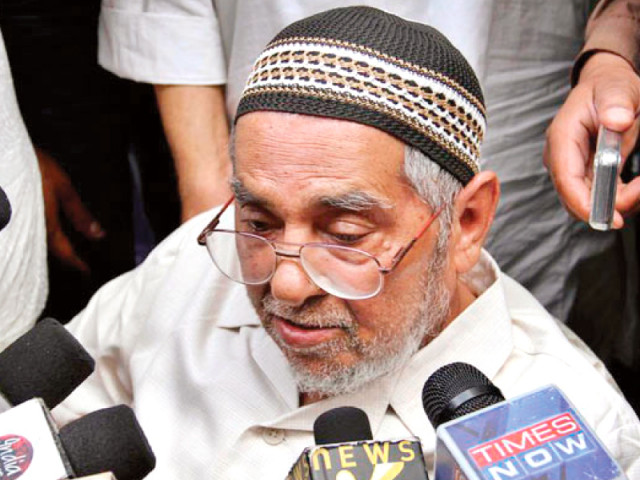After 31 years, Khalil Chishti back to teach virology at Karachi University
Microbiology dept head says professor to train students in cell culturing.

Spending 20 years in Indian jails has not wavered 80-year-old Prof Dr Khalil Chishti’s passion for virology. He was back at his alma mater to tell the students more about the highly specialised field of medical science. And to the surprise of many present there, the university announced he will be teaching virology again.
Pakistan’s first virologist, Dr Chishti had taken retirement from teaching at the University of Karachi (KU) in 1981. In 1992, he left for India to see his ailing mother where he was implicated in a murder case. He was handed down life imprisonment following an 18-year trial and sent to the Ajmer jail in January last year. Following talks between diplomats of India and Pakistan, he was allowed to go back to his country and arrived in Karachi in May.
On Tuesday, the KU held a reception in honour of the homecoming professor with support pouring in from faculty members, alumni and students. The microbiology department chairperson, Prof Dr Shahana Urooj Kazmi, announced that the professor will teach virology at the university.
“Dr Chishti used to talk about virology when even microbiology wasn’t truly established as a separate science,” she said. “Now he will train the students in cell, tissue and organ culturing.”
With only a few institutions specialising in virology present across the country, the decision to revive it under the man who pioneered the science at the university was received with enthusiasm by the microbiology faculty and the students alike.
Dr Chishti was in the very first microbiology batch of the state-run varsity in 1959. Until 1981, the department remained the only one teaching the subject across the country.
At the reception, Dr Chishti conducted an interactive session tracing the history of virology, tissue and organ culture at the KU, which if continued could have been used for better diagnosis and control of viral diseases in the country.
“When I was leaving the department, I had hoped that my students will make headway in the field,” said Dr Chishti. “But with the passage of time, almost everyone left [the country] for better opportunities.”
A number of students, however, were sceptical if the octogenarian professor will be able to train students in virology, after being practically, if not theoretically, disconnected from the field for more than 20 years.
“As far as science is concerned, 20 years is a long period,” said master’s student Attaur Rehman. “But I’ll take this opportunity as virology research has gone down in the university.”
While talking to The Express Tribune, Dr Kazmi said: “I do not expect he [Chishti] can do something extraordinary, but if students can learn viral diagnosis techniques under the supervision of an expert, they should by all means avail this opportunity.”
The microbiology students are offered a 24-credit-hour course in virology at the postgraduate level, but there is no practical training available.
“Although viral diagnostics are very expensive, it does not mean that the public-sector universities are deprived of this technology,” she said. “The government, at present, also pays to the private institutions like Aga Khan University Hospital for viral diagnosis.”
Dr Shakil Ahmed Khan, a professor at microbiology department, said that at least Dr Chishti had this confidence of pioneering a field of microbiological sciences in Pakistan, which the new scholars could never have.
While recalling the late 1960s, one of Dr Chishti’s classmates Prof Dr Syed A Sattar said that he still remembers Dr Chishti’s valiant efforts to establish a cell culture lab for virology research. “We spent innumerable days together writing research proposals on topics highly relevant to Pakistan before leaving for Canada,” said Dr Sattar, who is the director of University of Ottawa’s Centre for Research on Environmental Microbiology.
“I met Dr Chishti again in 1984 when he put together an international research team to investigate the viral etiology of respiratory infections among Hajjis,” he added.
Published in The Express Tribune, July 25th, 2012.


















COMMENTS
Comments are moderated and generally will be posted if they are on-topic and not abusive.
For more information, please see our Comments FAQ